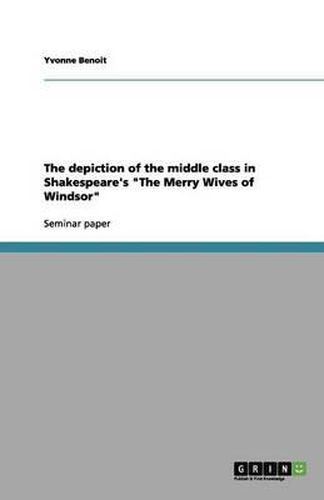Readings Newsletter
Become a Readings Member to make your shopping experience even easier.
Sign in or sign up for free!
You’re not far away from qualifying for FREE standard shipping within Australia
You’ve qualified for FREE standard shipping within Australia
The cart is loading…






Seminar paper from the year 2007 in the subject English Language and Literature Studies - Literature, grade: 1,0, Saarland University (Anglistik, Amerikanistik und Anglophone Kulturen), course: Hauptseminar Shakespeare’s Changing Comedies, 11 entries in the bibliography, language: English, abstract: The 17th century witnesses the rise of a new social class in England: the middle class. At this time, mainly merchants and traders belong to this community. They are rich, powerful and educated. In The Merry Wives of Windsor, the two middle class families, namely the Fords and the Pages, form the head of the Windsor community and are its leaders. In order to be able to understand the position of this social class in society, it needs to be seen in comparison with the other residents and visitors of the city. By choosing Windsor as the setting, Shakespeare links the city of Windsor and its independent middle class with the presence of the monarchy. The proximity to Windsor Castle and the siege of the Order of the Garter bring the aristocracy into the play and introduce the authority of the Crown. Due to Fenton’s and Falstaff’s presence in the play, Windsor’s middle class has to face the social class above them and the problems which exist between the two. However, it is not only the aristocracy which helps the Windsor middle class to define and establish themselves but also the foreigners in the play. Therefore, it is important to consider the interactions of the middle class with Parson Evans or Dr. Caius in order to see how far these foreigners differ from the English and how they help the Fords and the Pages to establish themselves in their society and to reconfirm their national identity as well as their position in society. The use of the term middle class , however, is problematic. Since it includes the term middle , the question arises of what middle actually means, opposed to whom or what this class is the middle and in which context it has to be seen. Since
$9.00 standard shipping within Australia
FREE standard shipping within Australia for orders over $100.00
Express & International shipping calculated at checkout
Seminar paper from the year 2007 in the subject English Language and Literature Studies - Literature, grade: 1,0, Saarland University (Anglistik, Amerikanistik und Anglophone Kulturen), course: Hauptseminar Shakespeare’s Changing Comedies, 11 entries in the bibliography, language: English, abstract: The 17th century witnesses the rise of a new social class in England: the middle class. At this time, mainly merchants and traders belong to this community. They are rich, powerful and educated. In The Merry Wives of Windsor, the two middle class families, namely the Fords and the Pages, form the head of the Windsor community and are its leaders. In order to be able to understand the position of this social class in society, it needs to be seen in comparison with the other residents and visitors of the city. By choosing Windsor as the setting, Shakespeare links the city of Windsor and its independent middle class with the presence of the monarchy. The proximity to Windsor Castle and the siege of the Order of the Garter bring the aristocracy into the play and introduce the authority of the Crown. Due to Fenton’s and Falstaff’s presence in the play, Windsor’s middle class has to face the social class above them and the problems which exist between the two. However, it is not only the aristocracy which helps the Windsor middle class to define and establish themselves but also the foreigners in the play. Therefore, it is important to consider the interactions of the middle class with Parson Evans or Dr. Caius in order to see how far these foreigners differ from the English and how they help the Fords and the Pages to establish themselves in their society and to reconfirm their national identity as well as their position in society. The use of the term middle class , however, is problematic. Since it includes the term middle , the question arises of what middle actually means, opposed to whom or what this class is the middle and in which context it has to be seen. Since